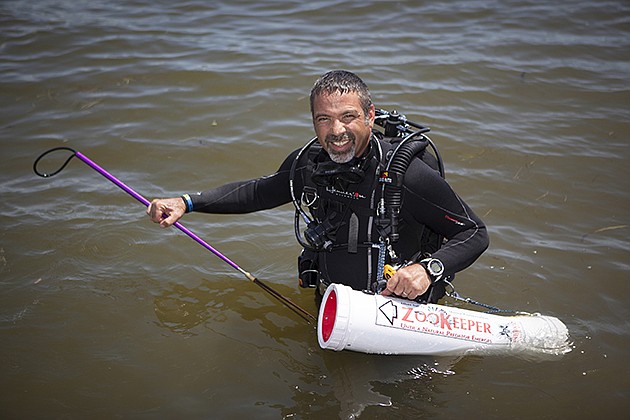- November 24, 2024
-
-
Loading

Loading

Allie ElHage knows what it's like to be stung on his hand by a lionfish while scuba diving.
“The pain is immediate and immediately excruciating,” says the Sarasota entrepreneur. “It felt like someone was pushing a red hot iron up my right arm.”
ElHage is the creator of the ZooKeeper, now a must-have accessory for any spear fisherman hunting the lionfish, an invasive species that is tasty to eat (the fish is not poisonous, but its spines are venomous).
Nonprofit organizations such as Mote Marine Laboratory in Sarasota and Reef Environmental Education Foundation in Key Largo have promoted the device while sponsoring lionfish eradication derbies that are attended by hundreds of scuba divers, chefs and foodies. For example, eight teams of 27 divers speared 456 lionfish from the Gulf of Mexico at the Sarasota Lionfish Derby promoted by Mote and REEF July 12.
ElHage, the son of Lebanese immigrants who grew up on the Caribbean island of Curaçao, says friends on the island invited him to scuba dive for lionfish in October 2010. Like it has in many places in the Caribbean and Florida, the species that originated in Asia reproduced quickly and was devouring native fish and crustaceans.
But ElHage says his friends were vulnerable to getting stung by the lionfish spines because they were using a mesh bag and a birdcage to contain the fish they had speared. “So I went to Curaçao's version of Home Depot and walked the aisles and I put a ZooKeeper together,” ElHage says.
The first version of the ZooKeeper was little more than some plastic pipe with a rubber opening. “That version failed miserably because the fish came back out,” he says.
Now many versions later, the patent-pending ZooKeeper has a specially designed funnel that lets divers stuff the fish into a large cylindrical container and a water-displacement mechanism so the fish don't flush out when divers stuff the tube. “In 2012 I sold about 100 units,” ElHage says.
A Sarasota resident, ElHage contracted with ValinTech, a local plastic injection molding company to manufacture the containers, and he assembles and ships them. “This year, I've sold more than 2,300,” ElHage says. Prices for a ZooKeeper range from $115 to $210, depending on size.
ElHage sells through dive shops and he helps promote their businesses at lionfish derbies and other scuba events. He distributes the ZooKeeper to them through Trident Dive Equipment and Innovative Scuba Concepts.
Besides lionfish, ElHage says divers have used ZooKeepers for containing lobsters and rockfish. He plans to add other safety items to the ZooKeeper, including gloves, knives and special handles. “ZooKeeper is all about diver safety,” ElHage says. “In the next few months there's going to be a whole slew of products.”
ElHage is careful to tell users that a ZooKeeper doesn't guarantee they won't get stung. Ironically, ElHage was using a ZooKeeper when he was stung. Like most stings that result from diver error, he had stuffed his ZooKeeper beyond the limits and some venomous spines were sticking out of the tube just enough to sting him. After a tetanus shot and a six-day treatment of steroids to reduce the swelling, ElHage was ready to dive again with his ZooKeeper.
ElHage says his product is making a difference for the environment. He recently traveled back to Curaçao for 10 days, where spear fishing lionfish has only recently been legalized. “I usually spear 50 to 60 a day,” he says. “I shot a total of 60 the whole time I was there.”
Follow Jean Gruss on Twitter @JeanGruss